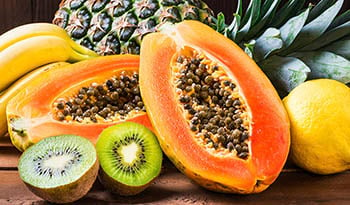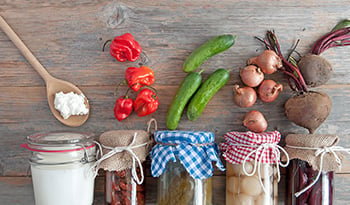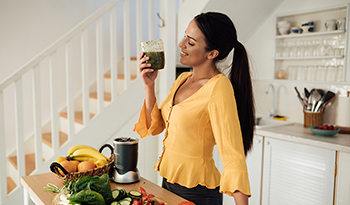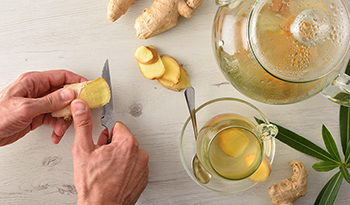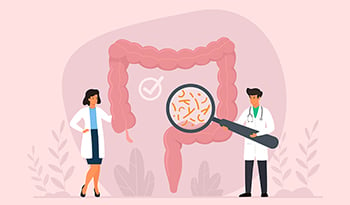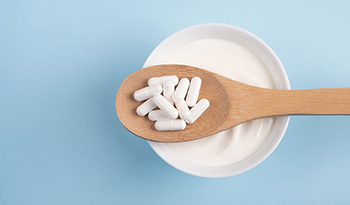Bloating Relief: Common Causes + Helpful Foods and Supplements
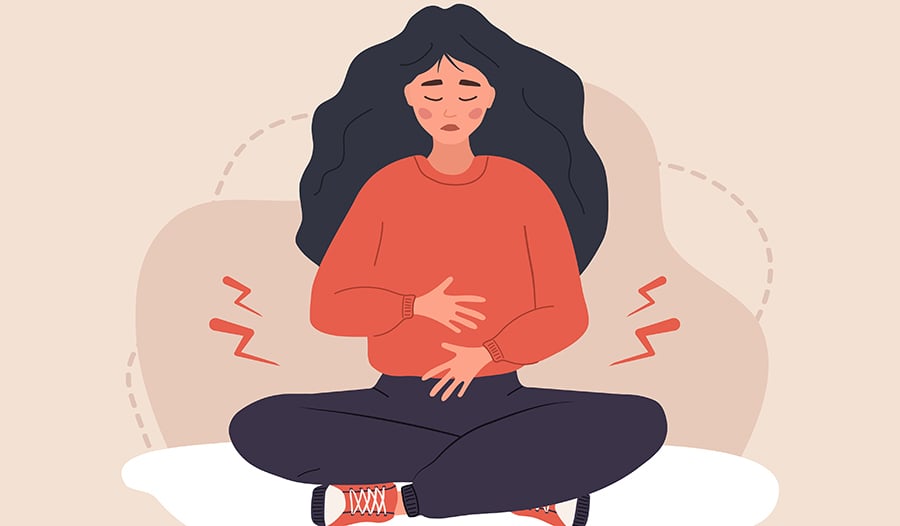
What Is Bloating?
Bloating—that uncomfortable, occasionally painful sensation of increased abdominal pressure. For many, bloating is the normal aftermath of a meal rich in beans and other notorious gas-producing foods. Yet, for some, bloating is all too frequent, and its effects are inconvenient, if not debilitating.
This article will examine the top causes of bloating and explore the evidence supporting natural treatments.
Causes of Bloating Beyond Excessive Gas
Bloating, often pinned on excess gas, has a more nuanced explanation. Sure, gas plays a role, but a host of other factors can cause uncomfortable sensations of bloating.
Fermentation
Have you ever wondered where the gas in our digestive system comes from? While some of it may be swallowed, especially if drinking carbonated beverages or chewing gum, most gas that causes problematic bloating originates from the gut microbiome. This complex ecosystem of bacteria living in our large intestines feeds on the undigested remains of our meal in a process called fermentation, releasing gases such as methane as a byproduct.
Constipation
Imagine a traffic jam on a busy freeway. When the digestive process slows to a crawl, the resulting pile-up can put pressure on the stomach or intestinal wall, causing a sensation of bloating.
Sensitization
In certain conditions, such as irritable bowel syndrome (IBS), bloating isn't just about pressure. The visceral nerves, responsible for communicating sensations from the gut to the brain, can become hypersensitive, leading to discomfort even in the absence of excess gas or waste.
Foods for Bloating Relief
Now that you know why the sensation of bloating occurs, let's delve into its common causes and explore strategies for relief.
The hundreds of bacteria living in your digestive system coexist in a complex ecosystem with you and each other. Each species evolves to digest very specific compounds, and what you eat for breakfast shapes the next generation of bacteria hosting lunch.
Altering your diet, even slightly, can send shockwaves through this community, resulting in increased gas and bloating. To fortify your gut against the unwelcome discomfort of an unprepared microbiome, prioritize diversity. Much like an Earth ecosystem, a reduction in diversity renders the system fragile and prone to imbalances.
To cultivate a resilient microbiome, eat a wide variety of fiber-rich plant foods such as fruits, vegetables, legumes, whole grains, nuts, and seeds. The keyword here is variety. Unlike a monotonous fiber supplement, diverse fibers support a diverse variety of bacteria. Introduce these fiber-rich foods gradually, allowing your microbiome the time it needs to adapt and thrive.
As useful as a plant-based diet is for supporting a diverse community of bacteria, increasing fiber in the diet does not replace bacterial species that have already died out.
Though probiotics can help with bloating when taken daily, they do not increase microbiome diversity in the long term. Instead, a diet high in fermented foods such as sauerkraut, kimchi, fermented vegetables, yogurt, kombucha, and kefir has the best evidence for re-populating the gut with a variety of bacterial species. If buying these items in the grocery store, look for products that have not been pasteurized and still have active live cultures, or consider fermenting your own at home.
The Role of Stomach Acid in Bloating
Your trusty gut bacteria will often catch what your digestive system misses, so any issues that cause an increased amount of undigested food particles to pass through the small intestine will result in excess gas and discomfort. Insufficient stomach acid is a prime culprit but often flies under the radar.
Nearly a quarter of the global population is on a heartburn medication that de-acidifies the stomach, placing them at risk of poor digestion. In one study, 43% of subjects on a proton pump inhibitor (PPI) were experiencing bloating after just 8 weeks of treatment. Age also appears to play a role, with older adults taking longer to re-acidify their stomachs after a meal.
For a natural boost in stomach acid, consider incorporating digestive bitters. The bitter flavor profile stimulates the stomach to secrete more acid. Likewise, bitter foods such as dandelion greens can be incorporated into a meal to aid in digestion. However, if you're on a PPI, such as omeprazole (Nexium), directly increasing the stomach acidity before a meal might be worth exploring. Betaine HCl is an encapsulated acid that, when taken before a meal, temporarily increases the stomach's acidity. Caution is advised, though, as those with stomach or intestinal ulcers should not use betaine HCl.
Lactose Intolerance and Bloating Relief
Probably one of the more well-known causes of bloating is lactose, which is a sugar found only in dairy products. Approximately 68% of the world's adult population lack the enzyme required to break down this sugar, leaving them prone to diarrhea and bloating when the lactose feast reaches their microbiome.
Mitigating lactose-induced bloating involves strategic consumption. Restricting dairy intake to around 2 cups of milk per day, or its equivalent in other dairy products, and spread throughout the day can reduce symptoms. You can also stick to dairy products such as Greek yogurt or hard cheeses, which are relatively low in lactose but still contain plenty of calcium.
Yet, if the allure of a tall glass of milk or scoop of ice cream is too great, lactase enzyme supplementation might help. Lactase, the enzyme responsible for breaking down lactose, can be taken as a pill or liquid to pre-digest this tricky sugar into a form we can absorb. While there is good evidence that lactase can be helpful, results vary greatly between brands, so some experimentation may be necessary.
Periods and Bloating Relief
Bloating is a frequent companion of the menstrual cycle and can be a lingering presence after menopause as well. The primary reason for this appears to be hormonal, though the exact mechanism remains unclear. Tackling this bloating variant can prove tricky.
In the realm of herbal remedies, chasteberry (Vitex agnus castus) emerges as a promising contender. Studied in the context of premenstrual syndrome (PMS), chasteberry was found to be effective for bloating in some studies but not in others.
The good news is chasteberry was consistently found to be effective for other PMS symptoms and was generally well tolerated, making it a worthwhile option to explore, especially if you are looking for relief from a variety of PMS symptoms.
The Hidden Role of Stress in Poor Digestion
In the diverse world of bloating, stress is an often overlooked culprit. Stress hormones, both directly and through downstream effects, induce a slowing of the gut, heightened sensitivity of visceral nerves, and alterations in the gut microbiome. This trio of effects creates fertile ground for uncomfortable bloating. Stress may also hold the key to the bloating experienced in people with irritable bowel syndrome (IBS), a common condition where stress-reduction techniques have proven beneficial.
Managing stress-related bloating can involve addressing the stress and mitigating its downstream effects. For example, incorporating mild exercise, practicing diaphragmatic breathing, and maintaining good posture are simple and effective daily habits that facilitate the passage of food through the intestines and help to counteract the sluggish motility found in stress-induced bloating. Enter yoga, a holistic form of exercise that fulfills these criteria and doubles as effective stress reduction. Indeed, clinical studies support Yoga as an effective intervention for IBS symptoms.
Supplements for Bloating Relief
Psyllium Husk
When incorporated slowly, the fiber supplement psyllium husk is another promising option to help reduce bloating related to a sluggish digestive system. Psyllium husk, unlike many other types of fiber, is not fermented by gut bacteria and is less likely to cause excess gas. It can firm up loose stools as well as treat constipation by drawing water into the intestines. Its unique properties may also make it easier to tolerate sources of fiber that feed healthy gut bacteria by slowing down fermentation and gas production.
Peppermint Oil
In the realm of herbal support, a combination of peppermint oil (menthol) and caraway oil shows promise in treating bloating caused by indigestion. Caraway has a long history of use in folk medicine as a digestive aid and modern science has backed this up. When taken together before meals, this duo shows promise in reducing spasms and pressure in the stomach and small intestine, providing relief from post-meal bloating. To reduce the risk of acid reflux, it is recommended to use an enterically coated peppermint oil supplement to prevent premature release near the esophagus.
Takeaway
With so many diverse causes of bloating, the proper treatment will depend upon the root problem. Equipped with this summary of common causes and remedies, I encourage you to discuss which might be right for you with your doctor.
References:
- Benson S, Siebert C, Koenen LR, et al. Cortisol affects pain sensitivity and pain-related emotional learning in experimental visceral but not somatic pain: a randomized controlled study in healthy men and women. PAIN. 2019;160(8):1719. doi:10.1097/j.pain.0000000000001579
- Chang YM, El-Zaatari M, Kao JY. Does stress induce bowel dysfunction? Expert Rev Gastroenterol Hepatol. 2014;8(6):583-585. doi:10.1586/17474124.2014.911659
- Chen Y, Lian B, Li P, Yao S, Hou Z. Studies on irritable bowel syndrome associated with anxiety or depression in the last 20 years: A bibliometric analysis. Front Public Health. 2022;10:947097. doi:10.3389/fpubh.2022.947097
- Compare D, Pica L, Rocco A, et al. Effects of long-term PPI treatment on producing bowel symptoms and SIBO. Eur J Clin Invest. 2011;41(4):380-386. doi:10.1111/j.1365-2362.2010.02419.x
- D’Silva A, Marshall DA, Vallance JK, et al. Meditation and Yoga for Irritable Bowel Syndrome: A Randomized Clinical Trial. Am J Gastroenterol. 2023;118(2):329-337. doi:10.14309/ajg.0000000000002052
- Definition & Facts for Lactose Intolerance - NIDDK. National Institute of Diabetes and Digestive and Kidney Diseases. Accessed November 19, 2023. https://www.niddk.nih.gov/health-information/digestive-diseases/lactose-intolerance/definition-facts
- Die MD van, Burger HG, Teede HJ, Bone KM. Vitex agnus-castus Extracts for Female Reproductive Disorders: A Systematic Review of Clinical Trials. Planta Med. 2013;79(7):562-575. doi:10.1055/s-0032-1327831
- Faber KP, Wu HF, Yago MR, et al. Meal Effects Confound Attempts to Counteract Rabeprazole-Induced Hypochlorhydria Decreases in Atazanavir Absorption. Pharm Res. 2017;34(3):619-628. doi:10.1007/s11095-016-2090-2
- Goerg KJ, Spilker Th. Effect of peppermint oil and caraway oil on gastrointestinal motility in healthy volunteers: a pharmacodynamic study using simultaneous determination of gastric and gall‐bladder emptying and orocaecal transit time. Aliment Pharmacol Ther. 2003;17(3):445-451. doi:10.1046/j.1365-2036.2003.01421.x
- Guilliams TG, Drake LE. Meal-Time Supplementation with Betaine HCl for Functional Hypochlorhydria: What is the Evidence? Integr Med (Encinitas). 2020;19(1):32-36. Accessed November 19, 2023. https://www.ncbi.nlm.nih.gov/pmc/articles/PMC7238915/
- Gunn D, Abbas Z, Harris HC, et al. Psyllium reduces inulin-induced colonic gas production in IBS: MRI and in vitro fermentation studies. Gut. 2022;71(5):919-927. doi:10.1136/gutjnl-2021-324784
- Gut-microbiota-targeted diets modulate human immune status. Cell. 2021;184(16):4137-4153. doi:https://doi.org/10.1016/j.cell.2021.06.019
- Lacy BE, Chey WD, Epstein MS, et al. A novel duodenal-release formulation of caraway oil and L-menthol is a safe, effective and well tolerated therapy for functional dyspepsia. BMC Gastroenterology. 2022;22(1):105. doi:10.1186/s12876-022-02181-5
- Ramirez FC, Lee K, Graham DY. All lactase preparations are not the same: results of a prospective, randomized, placebo-controlled trial. Am J Gastroenterol. 1994;89(4):566-570.
- Ringel Y, Ringel-Kulka T, Maier D, et al. Clinical trial: Probiotic Bacteria Lactobacillus acidophilus NCFM and Bifidobacterium lactis Bi-07 Versus Placebo for the Symptoms of Bloating in Patients with Functional Bowel Disorders - a Double-Blind Study. J Clin Gastroenterol. 2011;45(6):518-525. doi:10.1097/MCG.0b013e31820ca4d6
- Shanika LGT, Reynolds A, Pattison S, Braund R. Proton pump inhibitor use: systematic review of global trends and practices. Eur J Clin Pharmacol. 2023;79(9):1159-1172. doi:10.1007/s00228-023-03534-z
- Stoeger V, Liszt KI, Lieder B, et al. Identification of Bitter-Taste Intensity and Molecular Weight as Amino Acid Determinants for the Stimulating Mechanisms of Gastric Acid Secretion in Human Parietal Cells in Culture. J Agric Food Chem. 2018;66(26):6762-6771. doi:10.1021/acs.jafc.8b01802
- Washburn RL, Sandberg D, Gazdik Stofer MA. Supplementation of a single species probiotic does not affect diversity and composition of the healthy adult gastrointestinal microbiome. Human Nutrition & Metabolism. 2022;28:200148. doi:10.1016/j.hnm.2022.200148
DISCLAIMER:This Wellness Hub does not intend to provide diagnosis...
















































































 Table of Contents
Table of Contents





